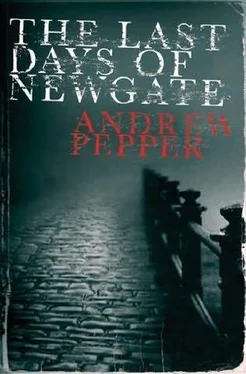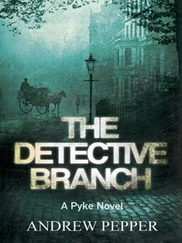Andrew Pepper - The Last Days of Newgate
Здесь есть возможность читать онлайн «Andrew Pepper - The Last Days of Newgate» весь текст электронной книги совершенно бесплатно (целиком полную версию без сокращений). В некоторых случаях можно слушать аудио, скачать через торрент в формате fb2 и присутствует краткое содержание. Жанр: Исторический детектив, на английском языке. Описание произведения, (предисловие) а так же отзывы посетителей доступны на портале библиотеки ЛибКат.
- Название:The Last Days of Newgate
- Автор:
- Жанр:
- Год:неизвестен
- ISBN:нет данных
- Рейтинг книги:4 / 5. Голосов: 1
-
Избранное:Добавить в избранное
- Отзывы:
-
Ваша оценка:
- 80
- 1
- 2
- 3
- 4
- 5
The Last Days of Newgate: краткое содержание, описание и аннотация
Предлагаем к чтению аннотацию, описание, краткое содержание или предисловие (зависит от того, что написал сам автор книги «The Last Days of Newgate»). Если вы не нашли необходимую информацию о книге — напишите в комментариях, мы постараемся отыскать её.
The Last Days of Newgate — читать онлайн бесплатно полную книгу (весь текст) целиком
Ниже представлен текст книги, разбитый по страницам. Система сохранения места последней прочитанной страницы, позволяет с удобством читать онлайн бесплатно книгу «The Last Days of Newgate», без необходимости каждый раз заново искать на чём Вы остановились. Поставьте закладку, и сможете в любой момент перейти на страницу, на которой закончили чтение.
Интервал:
Закладка:
Andrew Pepper
The Last Days of Newgate
[T]he gulf between how one should live and how one does live is so wide that a man who neglects what is actually done for what should be done learns the way to self-destruction rather than self-preservation.
NICCOLO MACHIAVELLI, The PrincePART I
London, England
FEBRUARY 1829
ONE
A metallic glint preceded the thrust of a knife blade, as a voice, a female voice, shouted his name.
‘Pyke.’
It may have saved his life.
The blade drew blood on his neck, a nick rather than a wound, and, turning like a whip, he stared into the hate-filled eyes of his attacker. Michael Flynn lunged at him again but this time he swayed backwards and avoided the blade’s arching loop, steadying himself before taking a grip of the Irishman’s wrist and snapping it sideways in a clean jerk that may well have broken bone. Flynn’s shriek confirmed his pain and, more importantly for Pyke, the knife clattered harmlessly on to the taproom’s sawdusted floor. Pyke released his assailant’s limp wrist and surveyed the mass of hostile faces assembled in the taproom of the Blue Dog tavern. He saw the back of her bonnet, bobbing as she hurried for the door, but she was too far away to be stopped. Later, he could not be sure he had not seen her face as well, but no clear image lodged in his mind. Momentarily he considered going after her, but he had more pressing issues to address. Though wounded, Flynn remained a dangerous adversary and Pyke wasted no time in retrieving the knife from the floor and pressing the blade against the receiver’s throat. His fee for sending his former associate to certain death on the gallows would be a mere
ten guineas. It would have made practical sense to slit the man’s throat in the alley outside the tavern and leave him for the resurrectionists but, whatever else he was, Pyke was not an assassin.
Instead he delivered the papist thief to his Bow Street offices and roughly pushed him into the felons’ room, ignoring the man’s threats to expose him.
It may have seemed incongruous, to some, that, only a few hours later, Pyke was being transported in an open carriage through the manicured grounds of an English aristocrat whose wife had claimed ancestry with the first earl of Essex, but he was neither amused nor unsettled by having to move between different worlds. Nor was he concerned by the inequalities such a difference drew attention to. He would leave such thoughts to the politicians: the blustering Whig aristocrats who spoke about freedom and responsibility in public and abused their servants in private, and Tory landowners who cared nothing about the hardships their wealth and privilege created for others.
Pyke had no time for radical sentiment, nor was he what one might call a monarchist. But he managed to amuse himself, if only for a moment, with the agreeable thought of a mob from the Blue Dog overrunning Lord Edmonton’s country home and hunting him with scythes and axes.
The carriage, a new, lighter two-wheeled cabriolet, had covered the treacherous terrain from Bow Street and north through Hackney and Homerton in less time than a short-stop stagecoach. Yet it had left him exposed to the elements and Pyke cursed Edmonton for insisting they meet at Hambledon Hall rather than at one of his town houses. That, and the inclement weather, redoubled Pyke’s determination to charge Edmonton at least twice the figure the old man intended to offer him.
As the afternoon rain began to clear, the old Elizabethan hall became visible, its crenellated stone walls and Gothic, semi-fortified tower reminders of an era long gone. Still, Pyke was disappointed by the distinctly shabby interior. There were none of the excesses that he had been expecting. Lit dimly by gas lamps and candles, the entrance hall had the feel of an empty tomb. Pyke reluctantly allowed one of the servants to take his heavy coat and was informed that Edmonton would be down to greet him in due course. Etiquette demanded that Pyke remain where he was, and so he unhesitatingly made his way through large doors into the Great Hall, an unappealing room cluttered with dark furniture and adorned with a gallery of grim-faced ancestral portraits. Ornately carved wooden brackets held up the heraldic panels of the ceiling. In the distance Pyke heard the soft notes of a piano and followed the sounds through another smaller set of doors, along a corridor and to the threshold of a lounge room warmed by a fire.
From the doorway, and without drawing attention to his presence, he watched Emily Blackwood, Lord Edmonton’s only progeny. Pyke followed her fingers as they stroked the piano’s keys and noted a contradiction between her expression, fixed in concentration, and her body, which moved in time with the rhythm of what she was playing.
She wore an embroidered muslin dress that enhanced her delicate frame. Her dark hair was gathered in a simple comb and offset her pale skin. He admired her fine looks as someone might appreciate a painting by Turner, an object that was pleasing to the eye but ultimately bland. Far better than Turner, for Pyke, was Hogarth, with his scenes of despair and violence. Better still was Hieronymus Bosch; those phantasmagoric images of human suffering made him feel, at once violated and aroused. In short, there was something too virtuous about Emily Blackwood, an element that shone from within her and made her not just unobtainable but somehow too perfect. He wondered whether she might crumble or snap into pieces, should anyone try to fuck her.
Though reluctant to spoil the moment, he feigned a cough. She stopped playing and looked up at him, startled and then angry. They had met once before when he had last performed a service for her father; however, he could not tell whether she recognised him or not. She worked for the philanthropist Elizabeth Fry, a woman of some public esteem, who had long campaigned for improved conditions in Newgate prison.
‘I would tell you to make yourself at home, but clearly you have already followed such advice,’ she said, without moving from behind the piano.
‘You are a very fine pianist.’ Pyke stepped into the room and ignored her indignation.
‘You fancy yourself as an expert?’ she asked, sceptically.
‘At first, I thought you were playing a piece by Mozart, one of his piano concertos perhaps. But then I considered the way you carried yourself, as though you were trying to hold something back against your will, and it made me revise my opinion.’
Her anger abated and a curious expression spread across her face. ‘You presume to know me, and what I played, perhaps a little too well.’
‘Last month, I saw this German fellow, Felix Mendelssohn, give a fine rendition of Beethoven’s Emperor Concerto in town. What you were playing reminded me a little of him.’
‘Mr Pyke, you are clearly more cultured than your reputation suggests.’
‘Oh? And what does my reputation suggest?’ He tried to hide his satisfaction that she had remembered his name.
‘When people talk of you, they do so with a reverence that borders, I would say, on fear.’
‘And you imagine that I seek to encourage such a reputation? Or deserve it?’ He was wearing a shirt with a collar to hide the cut he had received from Flynn’s blade.
This time she smiled a little. ‘I would imagine it serves your own interests quite well.’
‘My interests as a thief-taker?’
‘I have heard that only one of those words describes what you are, Mr Pyke. Or what you do.’
He couldn’t stop himself laughing. He looked at her again, approvingly this time. ‘You seem to know an awful lot about me, Miss Blackwood.’
Читать дальшеИнтервал:
Закладка:
Похожие книги на «The Last Days of Newgate»
Представляем Вашему вниманию похожие книги на «The Last Days of Newgate» списком для выбора. Мы отобрали схожую по названию и смыслу литературу в надежде предоставить читателям больше вариантов отыскать новые, интересные, ещё непрочитанные произведения.
Обсуждение, отзывы о книге «The Last Days of Newgate» и просто собственные мнения читателей. Оставьте ваши комментарии, напишите, что Вы думаете о произведении, его смысле или главных героях. Укажите что конкретно понравилось, а что нет, и почему Вы так считаете.












